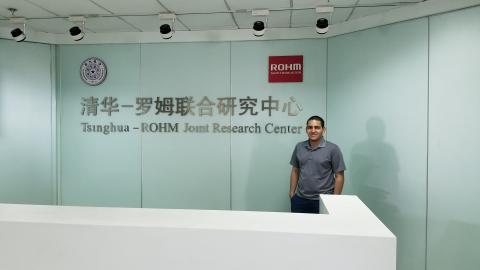Diaz-Caez Visiting Graduate Researcher at Tsinghua University this Summer

Electrical engineering Ph.D. student Christian Diaz-Caez was selected to participate in an NSF IRES project as a visiting graduate researcher at Tsinghua University this summer. The U.S. News and World Report ranks Tsinghua University as No. 1 in Global Universities in China rankings. The NSF-sponsored project primarily focused on energy-harvesting wearable embedded computer systems. The project was hosted by the University of Pittsburgh and Tsinghua University.
Diaz-Caez says of the experience, “It was an extraordinary opportunity to work with distinguished researchers and apply my knowledge and skills to design and develop innovative nanotechnology advancements.” His research findings will be submitted for the DATE 2020 Conference and Exhibition in Grenoble, France in his paper titled “Fine-Grained Power-Gating Techniques Using NVM and nvDFF Based on Ferroelectric FETs”.
A native of Puerto Rico, Diaz-Caez initially joined Howard University in 2015 as a research intern for the National Oceanic and Atmospheric Administration Center for Atmospheric Sciences, in what was his first trip to the contiguous United States. After graduating cum laude with his Bachelor of Science in Electrical Engineering from Universidad Del Turabo in 2016, Diaz-Caez applied for the Howard University electrical engineering graduate program. As a first-generation college graduate, Diaz-Caez has always been determined to obtain his Ph.D.
Diaz-Caez joined the Howard University Department of Electrical Engineering and Computer Science in 2017 as a full-time graduate student in the Master of Engineering in Electrical Engineering program. As a graduate research assistant for a project sponsored through the MSI STEM Research & Development Consortium, he developed a web-based collaboration platform for human terrain data analysis and unrest threat prediction. As a research engineer intern for the Johns Hopkins University Applied Physics Laboratory, he developed code, script and packages to control an array of antenna panels and generate microwave holographic images. He also serves as a research mentor for the Web Server Development Group in which he mentors undergraduate students within his department.
Diaz-Caez's role as a mentor has not been limited to his research activities at Howard University. He continues to provide guidance for students at his alma mater, sharing his best advice on advancing their education and careers. A member of several professional associations for minorities in engineering, such as SACNAS, AISES and SHPE, Diaz-Caez aspires to help enable and promote the success of minorities in engineering. He is currently working to build an international network to effectively pursue these interests. Diaz-Caez is also an active member of IEEE and AAAS.
What keeps Diaz-Caez motivated?
“No excuses!” is what Diaz-Caez continuously reiterates to himself through the most challenging of circumstances. Diaz-Caez managed to maintain his rigorous academic schedule, even when he remained without news on his family’s welfare following the devastating Hurricane Maria. He knew that staying focused on his educational goals was a guaranteed way to help his family. “Whenever I have felt like giving up, I remember everything my father sacrificed for me to able to continue my studies. He has always been my source of strength,” Diaz-Caez adds.
Oh, and Puerto Rican coffee.
“Puerto Rican coffee is the best,” he says.
